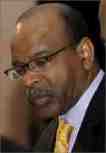Martial Law in New Orleans? Feds Intervene & Occupy Streets
/By Kevin Johnson, USA TODAY [HERE]
June 5, 2007

- Governor Extends Patrol of 300 National Guardsman
- Mayor Seeks Long Term Commitment for Nightly Overhead Air Patrols [MORE]
NEW ORLEANS — The federal government is in the midst of an unprecedented intervention into the local criminal justice system here, adding more than 40 agents and prosecutors to regain some basic daily operations lost to Hurricane Katrina nearly two years ago.
The effort comes as the city's violent crime increased 107% the first quarter of this year over the same time in 2006, according to the New Orleans Police Department. Superintendent Warren Riley said the increase is not an accurate measure but merely reflects the return of thousands of residents who had abandoned the city because of Katrina. Riley pointed out that crime is slightly down when compared with the last quarter of 2006.
Since February, federal agents have been assigned to street duties with police as surges in violence threaten the city's recovery. "The citizens of this city desperately need protection," U.S. Attorney Jim Letten said. "There are elements of the local justice system that have failed. That is flat unacceptable, and it has to change."
Federal and local agents have assembled an unusual watch list of 71 criminal suspects whose links to unsolved murders, robberies and assaults represent serious threats. The suspects — some linked to multiple killings — have at least one violent-crime conviction and might be eligible for mandatory federal sentences of five to 10 years if charged with new gun offenses.
•About 22 FBI agents are assigned to combat violent crime — at least 13 embedded with homicide detectives, Riley said.
•Drug Enforcement Administration agents got a temporary expansion of their authority to deal with gun crimes and other violent offenses, spokesman Michael Sanders said. The DEA also reassigned eight agents to work directly with police to help curb illegal drugs in a city where crack cocaine continues to fuel turf battles among returning dealers.
•Six federal prosecutors were added to the U.S. Attorney's Office to handle the increased focus on both federal gun and drug cases.
•The Bureau of Alcohol, Tobacco, Firearms and Explosives, which deployed six additional agents, expects to boost federal gun cases 27%, said David Harper, the ATF's top agent in New Orleans.
•Mayor Ray Nagin announced that the Louisiana Air National Guard would begin nightly patrols over the city through the end of the year. Military and local law enforcement officials are expected to meet this week to discuss possible patrols and a "long-term commitment" from the air guard, Defillo said.
(He would not say what role he saw the air guard playing - or what needs, specifically, the guard might meet - saying he was going to leave it "open ended."
Nagin, in his State of the City address last week, said helicopters from the air guard's counter-drug unit would begin patrols in the city this month. A spokesman for Nagin said Monday the "commitment" for those patrols is in place but the details still must be worked out.
Maj. Michael Kazmierzak, a Louisiana National Guard spokesman, said air patrols as part of the program are not unusual and are not specific to New Orleans.
He said the air guard has conducted operations in the city since Katrina. But he declined to describe those or how often they'd been carried out, saying that's not something the guard would publicize.[MORE])
But New Orleans District Attorney Eddie Jordan rejected the notion that the system had failed. "The storm interrupted our ability to prosecute cases," he said. Since last year, charges have been dropped against 3,000 suspects because of hurricane-related breakdowns in the legal system. Jordan said the storm destroyed the local crime lab and evidence needed to prosecute cases. He said most of those dismissals involved drug offenses.
"The federal government is doing what it can, but this is really our battle to win," Jordan said.
Riley said it will take "a minimum of a couple of years" to restore confidence. "When they see the criminal justice system working, once the citizens believe these things are happening, people will start coming forward" to help.
- Pictured above: New Orleans District Attorney Eddie Jordan.






























































































































































































































































































